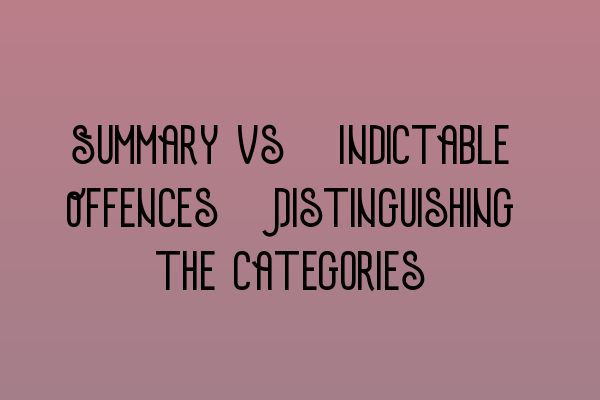Summary vs. Indictable Offences: Distinguishing the Categories
When it comes to criminal offences in the UK, it’s important to understand the different categories that they fall into to effectively navigate the criminal justice system. Two main categories of offences are summary offences and indictable offences. Let’s delve into the distinctions between these categories and gain a deeper understanding of each.
Summary Offences
A summary offence, also known as a “simple offence,” is a less serious criminal offence that is typically heard and decided by a magistrate in a Magistrates’ Court. These offences are generally considered minor and carry lower penalties compared to indictable offences.
Examples of summary offences include petty theft, public nuisance, minor assaults, and traffic violations. These offences are usually resolved relatively quickly and do not require a lengthy trial process. Instead, they are tried summarily, which means they are handled swiftly and without a jury.
One key advantage of summary offences is that they allow for a more streamlined process, minimizing the time and resources required for legal proceedings. However, it’s essential to note that some summary offences may still have serious implications for individuals involved, such as potential fines and criminal records.
If you are interested in gaining a deeper understanding of criminal practice and expanding your expertise, we highly recommend exploring our Workshops and Seminars on Criminal Practice: Expanding Your Expertise.
Indictable Offences
Indictable offences, on the other hand, are more serious criminal offences that carry significant penalties and are typically tried before a judge and jury in the Crown Court. These offences include offenses such as murder, robbery, sexual assault, and drug trafficking.
Due to their gravity, indictable offences usually go through a more complex legal process, involving formal charging, detailed investigations, and extensive trials. The involvement of a jury allows for a fair assessment of the evidence and ensures transparency in the decision-making process.
If you are preparing for the SQE Criminal Law assessment and looking to enhance your study group experience, we invite you to explore our article on Enhancing Your SQE Criminal Law Study Group Experience. It provides valuable insights and valuable tips to optimize your learning journey.
Distinguishing Factors
There are several key factors that distinguish summary offences from indictable offences:
- Sentencing: Summary offences generally carry lower maximum penalties, with fines and short prison sentences being the most common. Indictable offences, on the other hand, can result in significant imprisonment terms, potentially up to life imprisonment for the most serious crimes.
- The role of a jury: Summary offences are decided by a magistrate, whereas indictable offences typically involve a jury consisting of 12 individuals who assess the evidence presented before reaching a verdict.
- Legal process: Summary offences are resolved more expediently and require fewer steps in the legal process compared to indictable offences. Indictable offences involve formal charging, detailed investigations, and thorough examinations of evidence and witnesses.
If you are interested in diving deeper into the intricacies of criminal evidence rules, we invite you to explore our article on Decoding Criminal Evidence Rules: A Detailed Analysis. It provides a comprehensive analysis of the rules and principles behind the admission of evidence in criminal cases.
You Need Expert Legal Assistance
Regardless of the category of offence, it’s crucial to have expert legal representation to ensure the best possible outcome for your case. At SQE Criminal Law & Practice Law UK, we understand the complexities of the criminal justice system and provide the highest level of legal support to our clients.
Our team of experienced criminal defence solicitors is well-versed in handling both summary and indictable offences. We strive to protect the rights of our clients, provide sound legal advice, and diligently work towards favorable resolutions.
If you require legal assistance or have questions regarding summary or indictable offences, please don’t hesitate to contact us. Our dedicated team is here to help.
If you are interested in gaining insights into the public prosecution process in the UK, we recommend reading our article on Public Prosecutions in the UK: A Closer Look at State Prosecution. It offers a detailed examination of state prosecution and its implications in criminal cases.
Conclusion
Understanding the distinctions between summary and indictable offences is crucial for navigating the criminal justice system. While summary offences are considered less serious and are heard in Magistrates’ Courts, indictable offences are more severe and require legal proceedings in the Crown Court.
Whether you are faced with a summary offence or an indictable offence, seeking expert legal assistance is crucial. At SQE Criminal Law & Practice Law UK, we offer comprehensive legal support and guidance tailored to your specific needs.
If you would like to gain a deeper understanding of UK police procedures in criminal cases, we invite you to check out our article on Inside Look: Uncovering UK Police Procedures in Criminal Cases. It provides valuable insights into the investigative practices employed by UK law enforcement.
Remember, legal expertise is just a phone call away. Contact SQE Criminal Law & Practice Law UK today for trusted and reliable legal representation.
